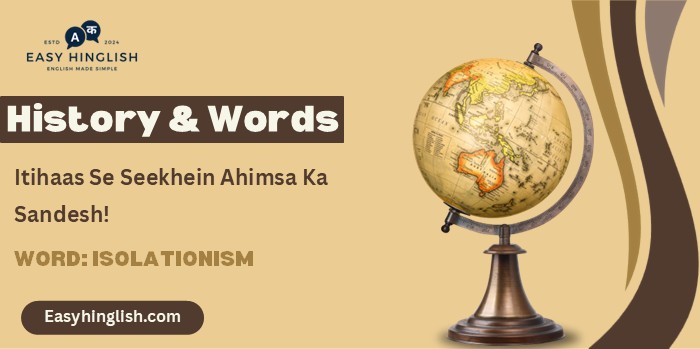History & Words: ‘Isolationism’ (13 April)
Welcome to ‘History & Words’! 🌟 Main hoon Prashant, Wordpandit aur Learning Inc. Network ka founder. Yeh series language learning aur historical context ko connect karti hai, taaki vocabulary improve ho aur history ki understanding bhi deep ho.
Chaliye, shabdon ki iss journey par mere saath chaliye aur naye naye words explore karte hain! 😊
📚 Table of Contents
🔍 Word of the Day: Isolationism
Pronunciation: /ˌaɪsəˈleɪʃəˌnɪzəm/ (eye-so-LAY-shuh-niz-um)
🌍 Parichay (Introduction)
13 April 1941—World War II ke backdrop me, Soviet Union aur Japan ne ek surprising move kiya: dono ne ek Neutrality Pact sign kiya, jiska aim tha ek dusre ke khilaf military conflict se bachna.
Yeh agreement Japan ke isolationist strategy ka hissa tha—wo Europe ke battlefield se door rehkar apni energy Pacific expansion pe lagana chahta tha.
“Isolationism” ka matlab hai: international conflicts aur foreign affairs se door rehna, taaki ek desh apne domestic goals pe focus kar sake. History me yeh policy kabhi protection ke liye, toh kabhi strategic advantage ke liye adopt ki gayi hai.
🌱 Shabd ka Utpatti (Etymology)
“Isolationism” bana hai:
- Isolate (Latin: insulatus) – “to make into an island”
- -ism – A suffix denoting practice or policy
19th century ke Europe aur 20th century ke America me yeh term popular hua, jab nations ne global conflicts se door rehne ka decision liya. Yeh policy peace aur self-interest dono ke naam pe adopt ki gayi.
📖 Mahatvapurn Shabdavali (Key Vocabulary)
- 🔑 Neutrality Pact – Agreement jisme do nations military non-aggression ka promise karte hain
- 🔑 Non-Intervention – Kisi external conflict me hissa na lena
- 🔑 Pacific Theater – World War II ka wo part jahan Japan ne Asia-Pacific region me operations kiye
- 🔑 National Sovereignty – Apne internal affairs ko bina external interference ke manage karne ka right
- 🔑 Strategic Withdrawal – Temporarily avoid karna kisi front ko, taaki resources kahin aur focus ho sake
🏛️ Itihasik Sandarbh (Historical Context)
WWII ke shuruaati daur me Japan aur USSR ke relations tense the—1939 me Khalkhin Gol me inka bloody clash bhi ho chuka tha. Par Germany ke aggressive eastward movement ke baad, USSR Germany ke potential invasion ko lekar cautious tha.
- 13 April 1941: USSR-Japan Neutrality Pact sign hota hai in Moscow
- Japan Europe ke war se alag rehta hai, aur South-East Asia me apna expansion continue karta hai
- USSR temporarily East se relief paata hai, aur West me Nazi Germany se nipatne ki tayari karta hai
Yeh pact tactical isolationism ka example tha—military neutrality jiska use power consolidation ke liye hua.
⏳ Samayrekha (Timeline)
- 1931: Japan Manchuria invade karta hai
- 1939: Soviet-Japanese conflict Khalkhin Gol me hota hai
- 1940: Japan Tripartite Pact sign karta hai (Germany & Italy ke sath)
- 13 April 1941: USSR-Japan Neutrality Pact finalize hota hai
- 7 December 1941: Japan Pearl Harbor attack karta hai—Pacific war erupt hoti hai
- 1945: USSR Japan ke khilaf war declare karta hai (Pact violate hota hai)
🌟 Is Din ka Mahatva (The Day’s Significance)
13 April 1941 ka pact ek strategic maneuver tha jisme:
- Japan ne Europe se apne aap ko isolate kiya, par Pacific ambitions ko fuel kiya
- USSR ne Germany se hone wale confrontation ke liye apna East secure kiya
- Isolationism yahan tactical diplomacy ka form ban gaya, na ki pure non-involvement
Ye din dikhata hai ki kabhi kabhi door rehna bhi ek powerful strategy ho sakta hai.
💬 Prasiddh Ukti (Quote)
“If we desire to avoid insult, we must be able to repel it. If we desire to secure peace… it must be known that we are at all times ready for war.”
— George Washington (advocating cautious neutrality)
(Matlab: Agar hum shanti chahte hain, toh hume tayyar rehna hoga—shant rehna ka matlab kamzor rehna nahi.)
🔮 Aaj Ka Matlab aur Chintan (Modern Usage & Reflection)
Aaj “isolationism” ek important political concept hai:
- ✅ Countries kabhi kabhi global conflicts se door rehkar domestic revival pe focus karti hain
- ✅ U.S. ne bhi WWII se pehle long-standing isolationist stance liya tha
- ✅ Pandemic ke baad nations ne health, trade aur defense me selective isolation dikhaya
Isolationism ka core idea hai: kab participate karna hai aur kab nahi—yeh decision samay, interest, aur risk par depend karta hai.
🏛️ Virast (Legacy)
- ✅ USSR-Japan pact ne short-term peace diya, lekin long-term me geopolitics dramatically badli
- ✅ WWII ke baad isolationism se global alliances (UN, NATO) ka shift hua
- ✅ Aaj bhi isolationist tendencies trade wars, immigration policies, aur foreign aid debates me dikhayi deti hain
- ✅ Concept evolve ho kar neo-isolationism ban gaya hai—selective engagement with global systems
🔍 Tulnatmak Vishleshan (Comparative Analysis)
Pehle: Isolationism peace aur protection ke liye adopt hota tha
Baad me: Iska misuse hua aggressive nationalism ya opportunism ke liye
Aaj: Isolationism aur globalism ke beech ka balance hi sustainable policy ban gaya hai
Ye batata hai ki duniya ke sath kab jurna hai aur kab door rehna hai, yeh ek fine art hai—not just a rigid rule.
💡 Kya Aapko Pata Hai? (Did You Know?)
🎓 Antim Vichar (Conclusion)
“Isolationism” ek word hai jo diplomacy, defense, aur identity sab ke beech me khada hota hai.
13 April 1941 ka USSR-Japan Neutrality Pact ek moment tha jahan participation se zyada non-participation powerful sabit hua.
Yeh word hume sikhata hai: kabhi kabhi duniya se alag rehna bhi ek smart strategy ho sakti hai—lekin uska samay aur context samajhna sabse zaroori hai.
📚 Aage Padhne Ke Liye (Further Reading)
- 📖 The Isolationist Temptation – William E. Leuchtenburg
- 📖 Japan Prepares for Total War – Michael A. Barnhart
- 📖 The Cold War: A New History – John Lewis Gaddis







